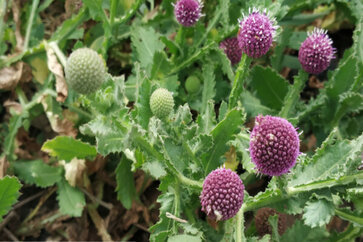What Indian Herb Is Good For Arthritis?
 Medicinal plants with an anti-inflammatory effect can help to alleviate the pain of rheumatoid arthritis. However, it is essential to evaluate its possible side effects and the correct doses of the remedies.
Medicinal plants with an anti-inflammatory effect can help to alleviate the pain of rheumatoid arthritis. However, it is essential to evaluate its possible side effects and the correct doses of the remedies.
Medicinal herbs have been used since ancient times, in Ayurveda, it has been in use for 5000 years as a supplement to manage the pain of rheumatoid arthritis. Although the treatment of this disease includes several drugs, there are some anti-inflammatory plants that can help to control its symptoms.
In fact, more and more patients are interested in this type of remedy, they consider them a good option to avoid severe episodes of pain. However, in many cases, there is a lack of scientific evidence to support the benefits attributed to them.
Therefore, before starting its consumption, the ideal is to consult your doctor to determine if there are possible interactions with medications or if perhaps, they produce side effects. With this in mind, below we go over the disease and the herbal remedies that help.
What is Rheumatoid arthritis?
In rheumatoid arthritis, there is a progressive deterioration of the joints, bilaterally, and progressively. Rheumatoid arthritis (RA) is an autoimmune disease that causes pain and deterioration of the joints. It often affects both sides of the body and its development occurs gradually.
Thus, if one joint is compromised, the same joint on the opposite side will also be affected. Due to the evolution of its symptoms, the disease is considered chronic. Even many patients begin to have the inability to do their daily tasks normally. In addition, pain can occur intermittently, with alternating episodes of relief and severe pain.
Rheumatoid arthritis symptoms
The symptoms of rheumatoid arthritis can be mild or severe, depending on the degree of progression of the disease. Pain crises can often be avoided when there is a timely diagnosis. Therefore, even if the pain disappears initially, it is advisable to consult your doctor.
Its clinical manifestations include:
- Pain in the joints, on one or both sides of the body
- Joint swelling
- Rigidity
- Loss of joint function
- Prolonged fatigue
Medicinal plants to manage rheumatoid arthritis pain
Natural remedies based on medicinal plants remain in place as a supplement to manage the pain of rheumatoid arthritis. Although the evidence of its action is based on anecdotal data, many patients claim to have some improvement after consumption.
Thus, if the doctor considers that there are no drawbacks, these may be a good option to improve the treatment of the disease. The most important thing is to make sure beforehand that they have no side effects or interactions.
1. Aloe vera
A herb popular in Ayurveda for the cure of many diseases is Anti-inflammatory and has soothing effects that have been attributed to Aloe vera gel. Aloe vera is one of the most popular medicinal plants in the treatment of diseases. Known since ancient times for its nutritional benefits, it continues to be an alternative remedy for hundreds of ailments.
Among these, it is important to note that it has a calming effect. For this reason, the external application of the gel it contains can help to manage the pain of rheumatoid arthritis. In addition, it stimulates circulation and prevents skin problems such as psoriasis and allergies.
How to use it?
- Extract a generous amount of Aloe vera gel and rub it on the joints with gentle massages.
- Repeat the treatment every night before going to bed.
2. Cat’s claw
It is another herb used in Ayurveda, it is also known as “Alai” or Ralan in Hindi. The Arthritis Foundation believes that a cat’s claw may be beneficial in controlling inflammation and pain.
Due to its anti-inflammatory and pain-relieving properties, the cat’s claw can help manage the pain of rheumatoid arthritis. In fact, according to data from the Arthritis Foundation, a study showed that it can provide benefits in reducing the inflammation of this disease.
How to use it?
- There are several ways to take advantage of the benefits of this plant. First, it can be obtained as extracts or ointments for external use.
- On the other hand, you can also prepare an infusion with a teaspoon of the plant in a cup of boiling water. This same is taken 2 times a day.
- Finally, it can be purchased in tablets or capsules, which are taken as directed.
3. Ginger
It is the most common ayurvedic herb in Indian kitchens. Recent studies confirm the inflammation regulating the role of ginger. One of the best natural treatments to reduce arthritis symptoms is undoubtedly ginger. Due to its contribution to gingerols, it has an anti-inflammatory effect that reduces swelling, stiffness, and pain. Studies on its action on RA patients have even yielded promising results.
How to use it?
- The traditional way to consume this spice is through tea. Its preparation is very simple: a teaspoon in a cup of boiling water. It is taken 2 or 3 times a day.
- Now it is also available in supplements and tablets. Also, its oil can be used topically.
4. Green tea
Loaded with antioxidants, green tea can reduce the symptoms of RA. Although it became popular for its slimming properties, green tea turns out to be a good ally for managing rheumatoid arthritis pain. This is due to its content of antioxidants and anti-inflammatory compounds that help protect the joints.
How to use it?
It can be ingested as a drink, tablet, or tincture. The dosage should be supervised by a doctor.
5. Willow bark
It is also an ayurvedic popular herb, also known as Indian Willow, bed-laila, Salix alba, etc. Willow bark contains salicylic acid, a powerful anti-inflammatory. This medicinal plant is one of the best-known when it comes to fighting inflammation.
Its extracts contain analgesic and anti-inflammatory agents that help alleviate pain. For this reason, since ancient times it has been used as an ally against joint problems, headaches, or neck pain, among others.
How to use it?
- First, you can prepare tea with a teaspoon of the plant in a cup of water. The idea is to take it 2 times a day.
- The second option is to buy it in tablets or supplements (they are taken as directed by the product).
Caution: It should not be taken in excess. An overdose can cause skin rashes and other manifestations of inflammation. It should not be ingested in case of allergy to aspirin or if you are under treatment with anticoagulants.
Note: Herbal medicine has become more popular with physicians in recent years. This is why some may suggest certain herbs as a supplement to manage arthritis pain. However, they are not a substitute for prescription drugs. In addition, their possible unwanted effects must be previously evaluated.























